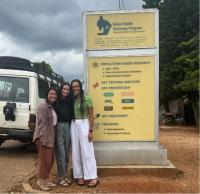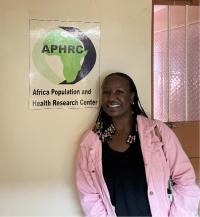Jennifer Schlecht Memorial Scholarship Fund

Jennifer Schlecht was a tireless champion for the rights and wellbeing of women and girls in humanitarian settings and left an indelible mark in advancing sexual and reproductive health (SRH) services in humanitarian response. The Jennifer Schlecht Memorial Scholarship for Sexual and Reproductive Health Justice in Fragile Settings was created to honor her life and legacy, with the goal of creating a group of highly trained, passionate public health leaders who are committed to championing sexual and reproductive health and rights. It provides travel funding to select PopFam MPH students pursuing SRHR Applied Practice Experiences (APEx) in fragile settings.
Current Students: The next round of applications will open in Spring 2026.
Congratulations to our 2025 Recipients!
During her APEx, Chandler Cooper worked with Zamara Foundation, a feminist advocacy organization based in Nairobi, Kenya. Zamara is dedicated to advancing sexual and reproductive health and rights (SRHR) and preventing gender-based violence among girls and young women in Kenya. She supported their “Gumzo Darasani” sessions, which creates safe spaces for girls to opening discuss topics such as feminism, comprehensive sexuality education, child marriage, and consent. Her work focused on analyzing session data, reviewing participant feedback, and strengthening the program’s monitoring and evaluation tools to better measure its impact.
In addition to program evaluation, Chandler wrote two concept notes on behalf of the organization, one on the intersection of SRHR and climate change and another on the digital rights of women in Kenya. She also represented Zamara Foundation at many regional events, including the 8th Annual Reproductive Health Network Kenya (RHNK) Conference and a UN Women East Africa commemoration event, where Zamara’s work was featured. Through this experience, Chandler deepened her understanding of feminist, community-driven approaches to public health and strengthened her commitment to advancing gender equity through practice.
Chandler’s favorite part of her APEx was being surrounded by the incredible team of women at Zamara Foundation. Their passion, mentorship, and more than anything, their friendship, made every day in the office amazing.
Emma Morris worked with Roots of Health, a non-profit organization in the Philippines, dedicated to improving SRHR on Palawan island, including reproductive health education for high school students and free, confidential, and accessible clinical SRH services. She worked with the Monitoring and Evaluation team to analyze survey data, using R programming language, to identify trends in contraceptive implant use and decision-making among youth and women in Puerto Princesa.
Emma then developed recommendations aimed at informing program improvements that support sustained contraceptive use and access shared in a report and presentation with Roots of Health staff. She created tangible tools for the implementation of these recommendations, including a qualitative research guide to address remaining knowledge gaps and an evidence-based patient risk assessment tool with tailored counseling strategies to address individual risk factors. These evidence-based program recommendations and implementation tools will allow for patient-focused service delivery to effectively decrease the number of unplanned pregnancies and increases access and use of contraceptive implants.
Emma’s favorite part of her internship was working with an organization that has built a long-standing, impactful presence in the area due to the leadership of affected community members. She loved learning from her team members and seeing their passion for working to serve their own community. This experience further encourages Emma to pursue SRHR work focused on community engagement and leadership.
Julia Philippe-Auguste conducted her APEx with the Center for Health Human Rights and Development (CEHURD), an indigenous research and advocacy organization based in Nakwero, Uganda. During her APEx, Julia drafted a report on the public health basis for sexual and reproductive health rights (SRHR) in Uganda, bridging the organization’s legal and advocacy expertise and public health evidence. Her work specifically focused on the public health arguments for abortion liberalization and the promotion of comprehensive sex education. Throughout this project, Julia conducted semi-structured interviews with key stakeholders, including Dr. Charles Olaro, Uganda’s Minister of Health. She continues to conduct qualitative data analysis, which she is using to parse out the complexities of SRHR in the country.
Additionally, Julia helped evaluate the efficacy of CEHURD’s community health advocacy (CHA) model. The CHA model works to ensure all citizens are able to realize their right to health by establishing grassroots advocacy networks that help guide individuals and communities through the Ugandan healthcare system. For this project, she documented the program’s contextual history, identified their theory of change, and conducted interviews using qualitative research methods to develop recommendations for future program implementation. Her final project was incredibly timely, as Julia also worked with the legal aid clinic to propose a “low-bono” framework, to allow CEHURD to continue its health litigation services in the wake of USAID funding cuts.
Julia is deeply grateful to Fatia Kiyange, Florence Matovu, and all of CEHURD for the opportunity to join their important health rights work. She is incredibly honored to be the first public health student to intern with CEHURD.
Past Recipients
2024
Roanne Elnogoumi worked at the Eastern Mediterranean Public Health Network (EMPHNET) headquarters, an NGO with a strong presence across 15 countries in the Eastern Mediterranean region. She worked with the Polio and Immunization team on The Way Forward for Pertussis Control in the Middle East and North Africa, a project focused on increasing Tdap vaccine uptake during the third phase of pregnancy to ensure safe pregnancies and reduce the burden of pertussis among infants. Roanne assisted with both qualitative and quantitative data collection and analysis, examining the current responses and measures taken by 13 countries across the Eastern Mediterranean Region. She co-facilitated discussions about the effectiveness of current measures, barriers to vaccine uptake among mothers, and explored alternative preventive methods for different populations during workshops.
She also helped develop a community engagement toolkit that could be used across all EMPHNET departments. Roanne compiled a comprehensive review that synthesized discussion points, recommendations, and action items for reducing pertussis on a regional level.
In addition, Roanne worked with the Research and Policy team on the Family Planning and Mental Health project which focused on documenting key risk factors for women who develop postpartum depression and creating appropriate interventions. She conducted a meta-analysis to assess the prevalence and risk factors of postpartum depression among women in the region.
Roanne’s favorite part of her internship was the opportunity to work in a community-driven environment where everyone's perspectives were respected and considered.
Sarah Branoff worked with Women and Rural Development Networks (WORUDET) and the International Rescue Committee to support the She Cares project, an initiative to increase access to self-managed contraception for refugees living in northern Uganda. Working in Palabek refugee settlement, Sarah conducted in-depth interviews with She Cares participants (including family planning clients, midwives, village health teams, and drug shop owners) to help document the rollout of the program and understand women’s experiences navigating self-care for sexual and reproductive health. She also supported program activities such as trainings for health providers aimed at increasing their capacity to counsel clients in self-injecting DMPA-SC (Sayana Press) and community engagement with “Youth Champions” and religious and cultural leaders to increase advocacy for SRH self-care in Uganda’s humanitarian settings. Some of the stories that Sarah collected can be found here.
Andrea Dongmo-Zebaze collaborated with the RAISE Initiative, International Rescue Committee (IRC) Chad, and the University of N'Djamena on a mixed-methods study focused on adolescent sexual and reproductive health (SRH) in Guéra, Chad. The study aimed to identify barriers and facilitators affecting adolescents aged 12–19 in accessing and utilizing SRH services in IRC-supported districts within the region. Leveraging her native fluency in French, Andrea effectively connected with colleagues and local communities to contribute to several key activities.
These included facilitating trainings for qualitative research facilitators and survey interviewers, supporting participatory sessions with adolescent girls, and survey data collection. She also supported coding and analyzing qualitative data transcripts. The findings are now being used to develop actionable recommendations and briefing materials for the IRC to enhance SRH service delivery for adolescents under the ProGeSan project.
The highlight of Andrea’s APEx was travelling with survey teams to different villages, where she gained a deeper understanding of the realities of fieldwork and household survey data collection. She also enjoyed working closely with adolescent girls through participatory activities, learning from them directly about their experiences. These valuable opportunities inspire Andrea to pursue further roles implementing community-centered SRH programming in Central Africa.
2023
Natalie Andrasko worked with the Women and Rural Development Network (WORUDET), a community-based women’s rights organization, in Northern Uganda. Natalie worked on the "SHE CARES" project to test the feasibility of introducing self-care sexual and reproductive health products, such as self-injectable contraceptives, to adolescent girls and young women living in Palabek refugee settlement and the host community. Natalie assisted with human-centered design qualitative research with adolescent girls, drug shop owners, and health workers to understand their feelings and acceptance of self-care sexual and reproductive health. She also conducted and analyzed baseline surveys to determine drug shops’ and health facilities’ readiness to introduce self-care products. Natalie's favorite parts of her APEx were learning more about the humanitarian ecosystem in Ugandan settlements, applying her Mailman coursework to the project, and exploring on the weekends with her wonderful coworkers. Read more about her experience.
Katherine Kennedy worked with the Rakai Health Sciences Program (RHSP) in Uganda, a collaboration among Makerere, Columbia, and Johns Hopkins Universities. Katherine performed quantitative data analysis for a project focused on the timing of puberty and its relation to school enrollment and social transitions among adolescents. She will continue to work with RHSP this academic year on a research grant related to orphanhood and HIV in the Rakai community. Read more about her experience.
Esther Parker worked with the African Population Health and Research Center (APHRC), an African-led research and policy institute, in Nairobi, Kenya. She supported a research study to evaluate the effectiveness of individualized counseling provided by community health volunteers (CHVs) in enhancing contraceptive uptake and continuation among adolescent mothers. Her primary activities involved planning and executing the endline survey, which entailed developing the endline survey questionnaire, creating the training manual for the endline data collectors, facilitating a week-long training for the data collectors, and conducting comprehensive literature reviews. Additionally, she participated in site visits to assess the progress of the intervention activities (individual counseling through CHVs) and supervised selected interviews. Read more about her experience.
2022
The Heilbrunn Department of Population and Family Health awarded the first scholarships in May 2022 to two students who went to Chad with International Rescue Committee (IRC) and PopFam's RAISE Initiative: Aminata Diarra and Theodora Varelis.
Aminata and Theodora worked with International Rescue Committee-Chad's Protection, Gender and Health (ProGeSan) program in partnership with RAISE and Université de N’Djamena. Theodora and Aminata supported two research studies in 2 refugee camps in Wadi-Fira, Chad: one focused on person-centered maternity care and the other on adolescent sexual and reproductive health. Here they are digitizing information gathered on a flip chart created by adolescents during a series of participatory research activities on sexual and reproductive health at Kounoungou refugee camp. Read more about their experience.









